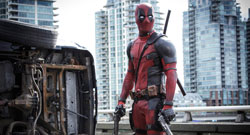With the superhero realm currently being so powerful and profitable, it would be completely understandable if writers and producers didn’t want to stray from the current safe formula. The only problem with this theory is that comic book enthusiasts like myself might get bored with seeing the typical, run-of-the-mill adaption starring capes, villains and prolonged action.
Fortunately, 20th Century Fox has an answer to this genre overload—a $132.7 million, action-packed, R-rated answer, that is. Deadpool, starring Ryan Reynolds and T.J. Miller, opened Valentine’s Day weekend and broke box office records in the United States including biggest R-rated opening weekend and biggest opening weekend for first time director, Tim Miller.
Although the film received high praise for successfully breaking the fourth wall, meaning that Reynolds’ character talked to the audience rather than pretending it wasn’t there, it sadly didn’t have the deepest of plots.
Originally introduced in the early 90s by Stan Lee’s Marvel Entertainment as a spin off from the stereotypical superhero, Deadpool serves as the mercenary alter ego of Wade Wilson, who develops special powers after undergoing a sketchy, life-threating treatment for his terminal cancer. In fact, Reynolds originally played this character in Fox’s 2009 version of X-Men Origins: Wolverine. But of course, his character, as well as the film itself, did not leave a memorable mark, and only brought in $55 million opening weekend—a surprisingly low number for the fourth installment to the X-Men series.
But before getting into the nitty-gritty details of how this film slaughtered everyone’s expectations, I should clarify that this movie is by no means suited for the faint-hearted or viewers under the age of 18. This wasn’t one of those, “Oh, it’s only rated R for mild language” situations; this fast-paced, 108-minute action comedy included everything from crude and offensive humor, slashed-off body parts, tremendous amounts of nudity and, of course, foul language. Seriously, some of the jokes I didn’t even understand. Deadpool was a mixture of Saw, X-Men and Step Brothers, but with triple the amount of blood and cursing.
It seems, however, that Deadpool’s fame did not just stem from the hilarity within dialogue (although there was tons), but the mere shock factor that 20th Century Fox associated a superhero with this type of screenplay. Not to the mention, Tim Miller practically opened the door for more hard R-rated fun in other Marvel territories, including the rumored talk of the untitled Wolverine 3 stepping onto those same grounds.
Deadpool’s writers also found themselves in hot water after introducing a character technically owned by Marvel Entertainment as well as using (and destroying) the broken down S.H.E.I.L.D. Helicarrier from 2014’s Captain America: The Winter Solider. Although Marvel movies are known for Easter egg-ing, or hiding certain cameos from other movies, 20th Century Fox does not own the rights to any of the characters, or plots, from Marvel comic books excluding X-Men, Fantastic Four, and now Deadpool. This explains why only two previously unseen X-Men characters are used as Deadpool’s sidekicks and why we probably will not be seeing them in the upcoming X-Men films.
Then what can be expected for the rumored 2017 Deadpool sequel? Well, just from what was seen in this movie alone, I can say more guts, more gore and maybe even a little bit more glory. An extended plot would be a plus, too.
In short, Deadpool not only delivered, but thrived with special help from the perfect salesman, Reynolds, who advertised this movie beautifully. So in theory, Deadpool may not be the superhero to save your cat from a tree or your house from burning, but he will definitely kick some serious butt out of an ex-boyfriend if asked nicely.
IMAGE TAKEN from foxmovies.com




